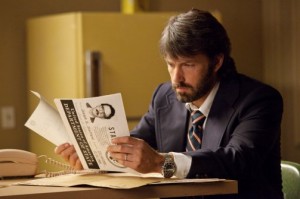 On a recent evening in Tehran, a movie night among friends turned into a heated political debate: Could Iran and the U.S. ever get past the hostage crisis of 1979?
On a recent evening in Tehran, a movie night among friends turned into a heated political debate: Could Iran and the U.S. ever get past the hostage crisis of 1979?The group had just finished watching a bootleg DVD of "Argo," the Hollywood hit depicting the 444-day siege by Iranian students of the U.S. Embassy in Tehran, and the story of how the Central Intelligence Agency extracted six diplomats at the height of the crisis.
"Argo" is taking Tehran by storm, circulating hand to hand and house to house. Young hipsters in northern Tehran, fruit peddlers in the bazaar, teachers in the suburbs, parliamentarians and members of the plainclothes Basij militia loyal to the regime have seen it.
Underground DVD sellers with national distribution networks say the video, which only recently became available on bootleg discs with Persian subtitles, is their best seller in years, selling upward of several hundred thousand copies.
For the past 33 years, the Islamic Republic has attempted to neatly archive the hostage crisis as a source of collective national pride accomplished in the name of revolutionary justice over Western imperialism. Most of the hostage-takers, then radical university students, later became prominent political figures in the reform movement, which led Iran's government for eight years.
Some Iranians are old enough to remember the event vividly; others know it through history books and decades of rhetoric and anniversary rallies.
As Iranian leaders contemplate whether to negotiate with the U.S. over their nuclear program, Argo has prompted a public debate of sorts about the wisdom of taking over the U.S. Embassy and the effect it had on Iran's foreign policy.
Many government officials today wear the embassy takeover as a badge of honor. Some were deeply unsettled by how, through the movie, the U.S. judged and portrayed their actions. Culture Minister Seyed Mohamad Hosseini called it an insulting anti-Iranian salvo in the West's propaganda war against Iran.
Masoumeh Ebtekar, a spokeswoman for the hostage-takers during the crisis, criticized the movie's representation of events, according to Iranian media reports. At a Q&A with students and professors after a screening at Sharif University, Iran's top engineering school, she called the movie a "weak interpretation of the truth," and said the students weren't the angry mob portrayed on screen, according to the reports.
For Ahmad Reza, a member of the Basij militia who said he recently saw "Argo" with some Basij comrades, the film didn't dent his pride in the revolution. Mr. Reza said it highlighted the rescue of six hostages to compensate for the U.S.'s failure to quickly secure the release of the other 52, who were held for 444 days.
But at least two prominent figures, a former foreign minister and a former ambassador, wrote letters published in Iranian media calling the takeover of the embassy a colossal error.
"The group of students, by taking over the American Embassy, cornered the Supreme Leader, the revolution committee and the government. The country and the people have paid a very grave price for this," Ibrahim Yazdi, who was the foreign minister in 1979 and is now a member of the opposition in Iran, wrote in an Iranian daily.
Many Iranians who watched the movie also said they saw the takeover as a mistake. "Violence entered our politics with the takeover of the American Embassy. Our leaders figured they could interact with the world with aggression and eventually this trickled down to the way they deal with their own people," said Shohreh, a 52-year-old woman who watched the movie among the group of friends in Tehran. She declined to give her last name.
The scenes in "Argo" of angry mobs attacking the compound and their aggressive treatment of hostages reminded some younger Iranians of the violent crackdowns against the 2009 election uprisings, when pro-regime mobs attacked protesters and raided the campaign headquarters of opposition leaders.
"When we see the uncompromising behavior of the government in the hostage crisis we subconsciously think of everything we have been through in the past few years," said Fereydoun, a 32-year-old in Tehran who watched the video with Shohreh and also declined to give her last name.
Iranian leaders, when dealing with the West, hardly mention the events of 1979 and the mark it has made on relations. But in 2011, when a mob of Basij militiamen stormed the British Embassy and residences in Tehran, the U.K. broke off diplomatic relations.
"The wheels that turn Iran's policies are not that different today than they were in 1979 during the hostage crisis," said Roozbeh Mirebrahimi, a New York-based political analyst and expert on Iran. "We have another group climbing embassy walls and beating up crowds."
Rasoul, a 28-year-old film student who declined to give his last name, said the Iranian people's eagerness to see the movie carried a message. "People are indirectly saying to the government that they are tired of this hostile behavior and it's time for us to be friends with the world and the U.S. again."
Iran could soon have its own cinematic retort. This month, a little-known Iranian filmmaker, Ataollah Salmanian, said he plans to respond to "Argo" with a film depicting Iran's version of the events.
By The Wall Street Journal
The Iran Project is not responsible for the content of quoted articles.










